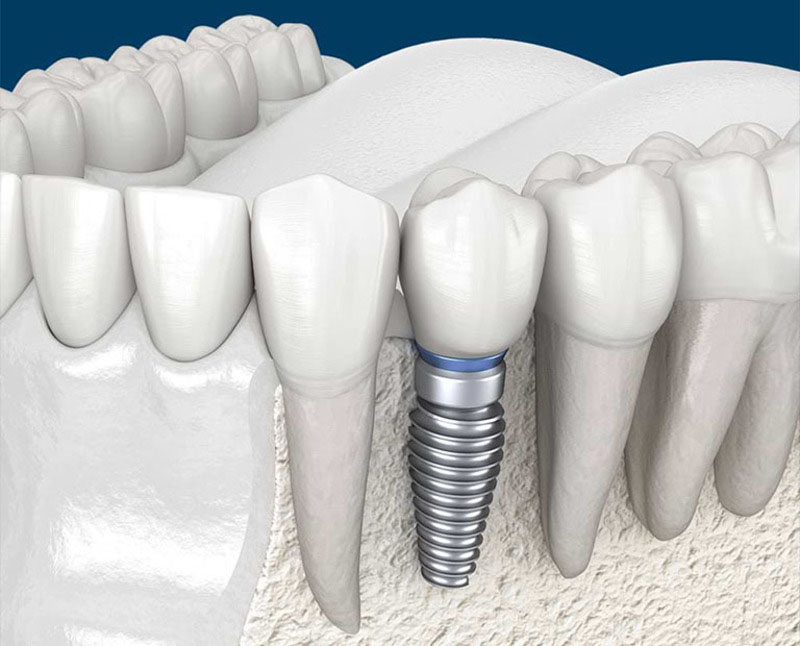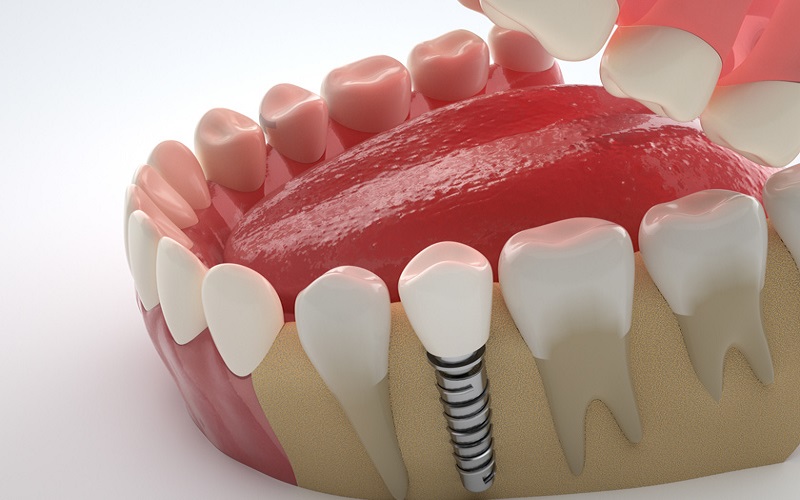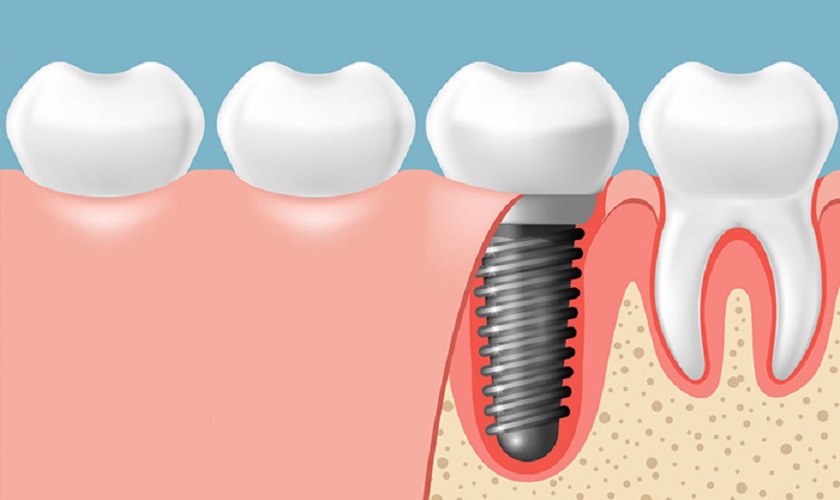The condition of tooth loss not only significantly affects chewing function and the aesthetic aspect of a smile but is also related to overall oral health. Dental implantation emerges as a “savior” to effectively address these issues. So, which dental implant address in Ho Chi Minh City is reputable, high-quality, and meets the needs of a diverse clientele? Let’s explore the content of the following article.
Dental Implantation: Bringing confidence to smiles and long-term oral health
What is Dental Implantation?
Dental Implantation is a modern dental technique aimed at restoring lost teeth by surgically implanting dental implants into the jawbone. The implant serves as an artificial tooth root, tightly connecting to the jawbone and supporting dental crowns or bridges above. Consequently, this method helps restore chewing function, enhance the aesthetic of smiles, and safeguard overall oral health.
Superior Advantages of Dental Implantation
Compared to traditional tooth restoration methods such as dental bridges or removable dentures, dental implantation offers numerous outstanding benefits:
- High Aesthetic Appeal: Implant posts are meticulously designed to mimic real teeth, restoring the natural shape and color of teeth, resulting in a radiant and confident smile.
- Perfect Chewing Function: Dental implantation helps restore chewing ability closely resembling natural teeth, allowing you to enjoy various types of food without difficulty.
- Long Lifespan: Implant posts are made from high-quality Titanium material, ensuring durability and excellent integration with the jawbone. With proper care, dental implants can last a lifetime.
- Oral Health Protection: Dental implants do not impact adjacent teeth, helping prevent cavities and other oral diseases.
- Preservation of Jawbone Structure: Implant posts stimulate the jawbone, preventing bone resorption and maintaining a youthful and balanced facial structure.
Trồng răng sứ cố định: Giải pháp phục hình răng hiệu quả
TOP 5 Trụ Implant Hàn Quốc tốt nhất hiện nay
Về nước Trồng Răng – Top 5 lưu ý cho khách hàng Việt kiều
Răng sứ Zirconia có tốt không? Có bao nhiêu loại?
Dental Implant: Is it Painful? Addressing Patient Concerns
Despite the undeniable advantages, many individuals wonder if dental implantation is a painful process. In reality, the level of pain during dental implantation depends on various factors, including:
- Doctor’s Expertise: A highly skilled and experienced doctor can minimize pain during the implantation procedure.
- Oral Health Condition: If the implantation area is inflamed or has significant damage, the procedure may cause more discomfort.
- Anesthesia Method: The use of local anesthesia helps numb the implantation area, reducing the sensation of pain.
It’s important to note that discomfort during and after the dental implantation procedure is typically manageable with pain medication, and many patients report minimal pain or discomfort during the recovery period. Communication with the dentist about any concerns and adherence to post-operative care instructions can contribute to a smoother and less painful experience.
In most cases, patients will not feel pain during the dental implantation procedure. However, after the anesthesia wears off, there may be a mild throbbing sensation. The discomfort tends to gradually decrease over several days or weeks after the implantation, depending on individual factors.
To alleviate pain after dental implantation, patients can consider:
- Applying an ice pack to the implantation area.
- Taking pain medication as prescribed by the dentist.
- Avoiding hard or chewy foods in the initial days.
- Maintaining gentle and regular oral hygiene practices.
These measures can contribute to a more comfortable recovery process, and any persistent or severe pain should be promptly discussed with the dentist.
Disadvantages of Dental Implantation – Things to Know Before Deciding
Despite offering numerous outstanding benefits, dental implantation does have some inherent drawbacks that individuals should be aware of:
- High Cost: The cost of dental implantation is typically higher compared to other tooth restoration methods.
- Extended Implementation Time: The dental implantation process usually takes 3 to 6 months as it involves waiting for the integration of the jawbone with the implant post.
- Potential Complications: While the occurrence of complications is low, there is still a possibility of issues such as infection at the implantation site or a lack of integration between the implant post and the jawbone.
To mitigate these drawbacks, patients should thoroughly research the dental implantation method, choose a reputable dental facility, and adhere to proper oral care practices following the implantation procedure. Understanding these factors can help individuals make informed decisions about their dental treatment.
The dental implant procedure adheres closely to international dental standards, ensuring maximum safety and effectiveness for patients:
Examination and Consultation:
The dentist conducts an examination to assess the oral condition, utilizes X-rays to measure the density of the jawbone, and develops a suitable treatment plan.
Implantation of the Implant:
The dentist performs the implantation procedure by surgically placing the implant post into the jawbone after making an incision in the gums. The procedure is carried out under anesthesia to ensure the patient feels minimal discomfort.
Healing and Bone Integration:
Following the implantation, the jawbone gradually integrates with the implant post over a period of 3 to 6 months. Regular follow-up appointments are scheduled for the dentist to assess the healing process and bone integration.
Fabrication of Porcelain Crown or Bridge:
Once the jawbone has successfully integrated, the dentist proceeds to fabricate a porcelain crown or bridge. For each patient, the porcelain crown or bridge is designed based on dental impressions, ensuring optimal aesthetics and chewing function.
This procedure guarantees that the entire dental implantation process is carried out professionally, safely, and yields effective results for the patient.
Dental Implant All on 4 – An Effective Full Arch Restoration Solution
For cases involving the loss of multiple consecutive teeth or complete loss of an arch, the All on 4 Dental Implant is an excellent option. This technique utilizes only 4 implant posts to restore the entire upper or lower arch of teeth, offering various benefits to patients:
- Cost Reduction: All on 4 Dental Implants are a more cost-effective solution compared to traditional implantation methods, as only 4 implant posts are required.
- Time Efficiency: This method saves time as it involves the placement of only 4 implant posts, reducing the overall duration of the procedure compared to traditional implantation.
- Quick Restoration of Chewing Function: Following All on 4 Dental Implantation, patients can receive temporary tooth restorations immediately, enhancing their ability to chew while waiting for bone integration.
The All on 4 Dental Implant is a practical and efficient solution for those facing the loss of multiple teeth, providing a faster and more cost-effective approach to full arch restoration.
Cost of Dental Implant – Factors to Consider When Choosing Restoration Solutions
The cost of dental implantation depends on various factors, including:
- Number of teeth to be restored: The more teeth that need restoration, the higher the overall cost.
- Type of Implant and porcelain used: Different types of implants and materials for crowns or bridges may have varying costs.
- Skill and experience of the dentist: A highly skilled and experienced dentist may charge higher fees for their expertise.
- Dental facility: The location and reputation of the dental facility performing the procedure can impact the overall cost.
To determine the exact cost of dental implantation, patients need to visit a dental clinic for a direct consultation. During this visit, the dentist can assess the specific needs of the patient, discuss the type of implant and materials, and provide a tailored treatment plan along with associated costs.
Dental Implant: Is it Painful? Addressing the Concerns of Many
As mentioned above, dental implantation is performed under anesthesia, ensuring minimal discomfort for the patient. However, after the anesthesia wears off, there may be a mild sensation of pain. To alleviate this discomfort, patients can use pain medication as prescribed by the dentist and apply an ice pack to the implantation area.
Why Choose Dental Implantation to Replace Missing Teeth?
Dental implantation is currently the most effective method for restoring missing teeth, offering numerous benefits to patients:
Preservation of Jawbone: When a tooth is lost, the jawbone gradually undergoes resorption, leading to bone deterioration. Dental implantation helps maintain chewing pressure on the jawbone, preventing bone deterioration.
No Impact on Adjacent Teeth: Unlike other restoration methods, dental implantation does not affect neighboring teeth, contributing to the overall preservation of oral health.
High Aesthetic Appeal: Porcelain crowns or bridges are crafted based on the patient’s dental impressions, ensuring a natural and aesthetically pleasing restoration of teeth.
Which Cases Should Avoid Dental Implantation?
Although dental implantation is the most effective method of tooth restoration, not everyone is eligible for this procedure. Cases in which dental implantation may not be suitable include:
Patients with serious health issues such as diabetes, heart disease, compromised immune systems,…
Insufficient or weak jawbone density unable to withstand the forces exerted by the implant post.
Patients undergoing cancer treatment or those who have previously undergone cancer treatment.
Conclusion
Dental implantation is an optimal solution for tooth restoration, providing numerous benefits for patients such as a confident smile and long-term oral health. Despite some inherent drawbacks, the professional, safe, and effective nature of the implantation process ensures patient satisfaction. Before deciding on dental implantation in Ho Chi Minh City, patients should thoroughly research the method and seek advice from their dentist to make an informed decision.





